Dear Ella,
As a child, I remember watching my mom sitting in shul crying on Yom Kippur. As an adult, I’ve done some reading about the meaning of this holiday and the self-reflection and cleansing that goes with it.
The problem is, I cannot forgive, and that has hardened my heart.
My mother, a broken woman, a survivor of Auschwitz, is now 94 years old and I’m still caring for her. My entire life she treated everyone around her with love and respect, that is, everyone except my father and me, her only child. She used us as her outlet for the darkness that lived inside her. My memories are of fighting, beatings, criticism and rejection. My father died 23 years ago, and my mother will not make it to next Yom Kippur. I would like nothing more than to forgive her, so that I can move on. Soon it will be too late. How do people manage to forgive? It’s not that easy for me.
Heartless
READ: FOR JEWS, FORGIVENESS IS COMPLICATED
Dear Heartless,
The relationship between a mother and daughter can be complicated, especially when you are the only child of a survivor. Your mother has never really recovered from her experience in the Holocaust, and the result was a dysfunctional family unit from which you are still trying to mend. She treated others well because they were strangers. You and your father were her family, her life, and she felt safe and loved, in her own way, so she was able to let go and be herself around you. Instinctively she knew, no matter what, you would always be there. And she was right, because you are still caring for her at the end of her life.
What does that say about you? You say you can’t forgive her, yet you have the compassion and respect to stay by her side till the end. That’s a connection that comes from somewhere deep inside.
You can’t change the past. The way she raised you cannot be altered. In order for you to heal and forgive, you must move forward.
Your wounds are deep. However, If you search your heart, perhaps you will remember the time she took care of you when you were sick, or maybe made you that birthday party, or bought you that special dress, or even something as small as her stroking your hair. Search for that positive connection the two of you shared. Something tells me it’s in there.
Perhaps you can start by writing down your thoughts. Journal about the memories that make it so hard for you to forgive. Recall one thing at a time and really think about it. Now try to judge that memory from your mom’s side. Think about her life and how you both came to the point you are writing about. Take your time – this is an emotional journey and the damage that was done over a lifetime can’t be undone overnight.
Then try the same process about anything good you can remember. It may not be much, it can be something very small. This exercise will be cathartic and a good way to organize your feelings and begin to deal with them.
Finally, write your mom a letter. You won’t necessarily read it directly to her. This letter is therapeutic, and she may no longer be here when you reach this step.
This Yom Kippur will probably not be the one where you are able to forgive your mother. You need more time to remember, reflect and process, but opening that dialogue within yourself is a necessary start. It could take months or years, and you may find the help and guidance of a professional invaluable.
This emotional journey is worth taking. It will lead you on a complicated path of discovering who you are and who you’ve become, with the goal of eventually being in a place where you can make peace within and forgive your mother.
To all my readers, Shanah Tovah, Gmar Chatimah Tovah. May you be inscribed in the book of life for a meaningful 5777.
